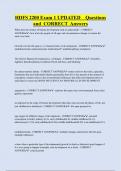HDFS 2200 Exam 1 UPDATED Questions
and CORRECT Answers
What does the science of human development seek to understand? - CORRECT
ANSWER✔✔- how and why people of all ages and circumstances change or remain the
same over time
Growth over the life span is...(5 characteristics of development) - CORRECT ANSWER✔✔-
multidirectional, multicontextual, multicultural*, multidisciplinary and plastic
The field of Human Development is...(4 things) - CORRECT ANSWER✔✔- Scientific,
Applied, Interdisciplinary (combines Psych and Soc), and Studying
the nature-nurture debate - CORRECT ANSWER✔✔- nature refers to the traits, capacities,
limitations that each individual inherits genetically from his or her parents at the moment of
conception. nurture refers to the environmental influences that affect development after an
individual is conceived. BOTH INFLUENCE AN INDIVIDUAL IN DEVELOPMENT.
epigenetics - CORRECT ANSWER✔✔- explores the many ways environmental forces alter
genetic expression
an approach to the study of human development that takes into account all phases of life, not
just childhood or adulthood - CORRECT ANSWER✔✔- life-span perspective
age ranges for different stages of development - CORRECT ANSWER✔✔- prenatal
(conception to birth), infancy (0-2), early childhood(2-6), middle childhood (6-11),
adolescence(11-18), early adulthood(18-40), middle adulthood(40-65), Late adulthood (65+)
multidirectional - CORRECT ANSWER✔✔- multiple changes characterize the life span,
multiple influences
a time when a particular type of developmental growth (in body or behavior) must happen if
it is ever going to happen (example: arm development on a fetus) - CORRECT
ANSWER✔✔- critical period
,a time when a certain type of development is most likely to happen or happens most easily,
although it may still happen later with more difficulty. - CORRECT ANSWER✔✔- sensitive
period (Example: early childhood is considered a sensitive period for language learning)
multicontextual - CORRECT ANSWER✔✔- development occurs in many different contexts
such as environment and family configurations
ecological-systems approach (who created it?) - CORRECT ANSWER✔✔- Created by Urie
Bronfenbrenner. the view that in the study of human development, the person should be
considered in all the contexts and interactions that constitute a life. (later named the
bioecological theory) composed of microsystems, ecosystems, and macrosystems
a group defined by the shared age of its members, who, because they were born at about the
same time, move through life together, experiencing the same historical events and cultural
shifts. - CORRECT ANSWER✔✔- cohort
A person's position in society as determined by income, wealth, occupation, education, and
place of residence (sometimes called social class) - CORRECT ANSWER✔✔-
socioeconomic status (SES)
a system of shared beliefs, norms, behaviors, and expectations that persist over time and
prescribe social behavior and assumptions - CORRECT ANSWER✔✔- culture
an idea that is based on shared perceptions, not on objective reality. Many age-related terms
such as childhood, adolescence and senior citize are this term - CORRECT ANSWER✔✔-
social construction
the mistaken belief that a deviation from some norm is necessarily inferior to behavior or
characteristics that meet the standard. people unlike us are inferior. - CORRECT
ANSWER✔✔- difference-equals-deficit error
people whose ancestors were born in the same region and who often share a language, culture
and religion - CORRECT ANSWER✔✔- ethnic group
, a group of people regarded as distinct from other groups on the basis of appearance, typically
skin color. - CORRECT ANSWER✔✔- Race (social scientists think race is a misleading
concept, as biological differences are not signified by outward appearance)
multidisciplinary - CORRECT ANSWER✔✔- multiple disciplines (like psychology and
sociology) involved in human development studies
plasticity - CORRECT ANSWER✔✔- human development embraces the idea that it is
plastic. Human traits can be molded and yet people maintain a certain durability of identity
a view of human development as an ongoing, ever-changing interaction between a person's
physical and emotional being and between the person and every aspect of his or her
environment, including the family and society. - CORRECT ANSWER✔✔- dynamic-systems
approach
the idea that some people are more vulnerable than others are to certain experiences, usually
because of genetic differences - CORRECT ANSWER✔✔- differential sensitivity
a framework for explaining the patterns and problems of development - CORRECT
ANSWER✔✔- developmental theory
a theory of human development that holds that irrational, unconscious drives and motives,
often originating in childhood, underlie human behavior - CORRECT ANSWER✔✔-
psychoanalytic theory
who thought of the psychoanalytic theory - CORRECT ANSWER✔✔- Sigmund Freud
Erik Erikson - CORRECT ANSWER✔✔- added three more stages to Freud's 5 stages of life
that are focused on family and culture rather than sexual urges.
a theory of human development that studies observable behavior. Also called learning theory
- CORRECT ANSWER✔✔- behaviorism
creator of behaviorism - CORRECT ANSWER✔✔- John B. Watson




